
The music competition Liet International is specific to minority and regional languages. In the time before I became a linguistics student, I heard about it through the then-existing Sprogmuseum, and I remember finding the topic very interesting. Back then I did not expect that over 10 years later I would get the opportunity to be among the live audience – when in took place in Denmark, Tønder, on Friday 13th of May 2022, right between the semifinals and grand final of another song contest. I went there together with three other participants in Lingoslam.
At Liet International, there were 13 artists, each with one track. None of the participants sang in English, but they represented one language (or more) – and so it doesn’t make a lot of sense to see them as representing countries, and they were very specifically not singing in their country’s majority language. For instance, Yourdaughters sang in Danish, but were from the Danish minority in Germany, while Martin Hørløck from Denmark sang both in Southern Jutlandic (Synnejysk) and German. Multiple countries had several entries, and besides Yourdaughters, Die Tüdelband and Martje Johannsen & Christoph Hansen were also from Germany. Ingá-Máret Gaup-Juuso qualified by winning the Sámi Grand Prix and could maybe be considered as representing the whole of the Sámi area, which goes across the borders of multiple countries (at least Norway, Sweden and Finland). There doesn’t seem to be a heavy set of rules about who is participating how, and they are in any case not tied up to the representation of countries.
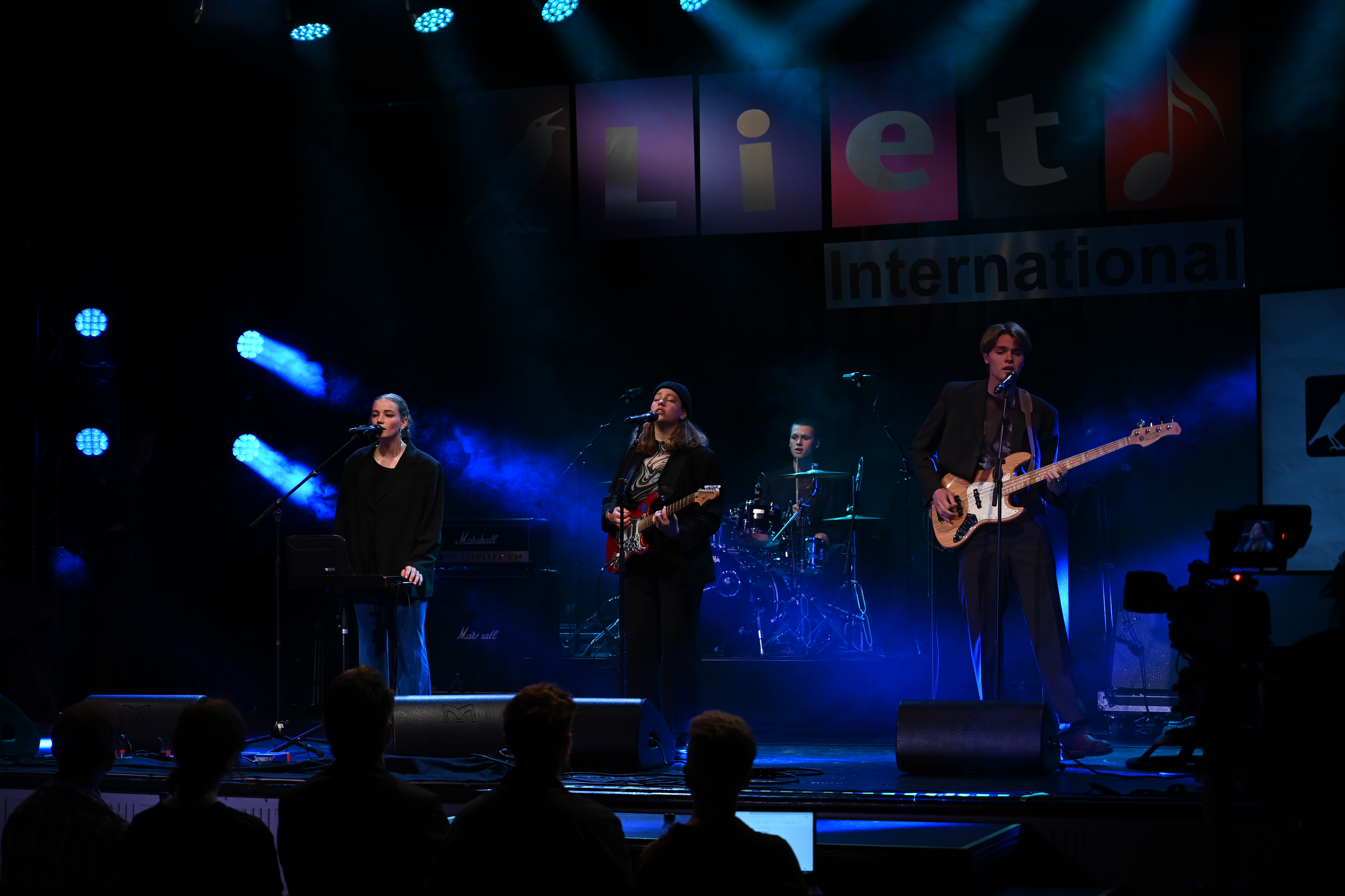
In the best Eurovision-style, we experienced dramatic voting, glittering outfits and multilingual hosts. “Good evening, Europe” was replaced by “Mojn, Europe” and the hosts introduced the event in both Danish, German, English and Souther Jutlandic. The use of English was in no way dominating and it was just another language, now on par with Danish and German – not everything was repeated automatically in every language! We also got to know the artists a bit after each performance, where they were interviewed about e.g. their personal relation to music and their language. They were interviewed in one of the mentioned languages, and I was pretty happy with my knowledge of German at that point. The jury was also interviewed a couple of times during the evening with approximately the same variation in language.
As a member of the audience, we received a small book about Liet International with general information and specific information about each artist, including the lyrics for each song and a translation – which was very helpful and made it possible to sing along a little bit, something I could have used during other music competitions. Liet International is created in collaboration between a number of different organizations, locally and for the involved communities and languages, and with the Council of Europe and sponsors.
Music
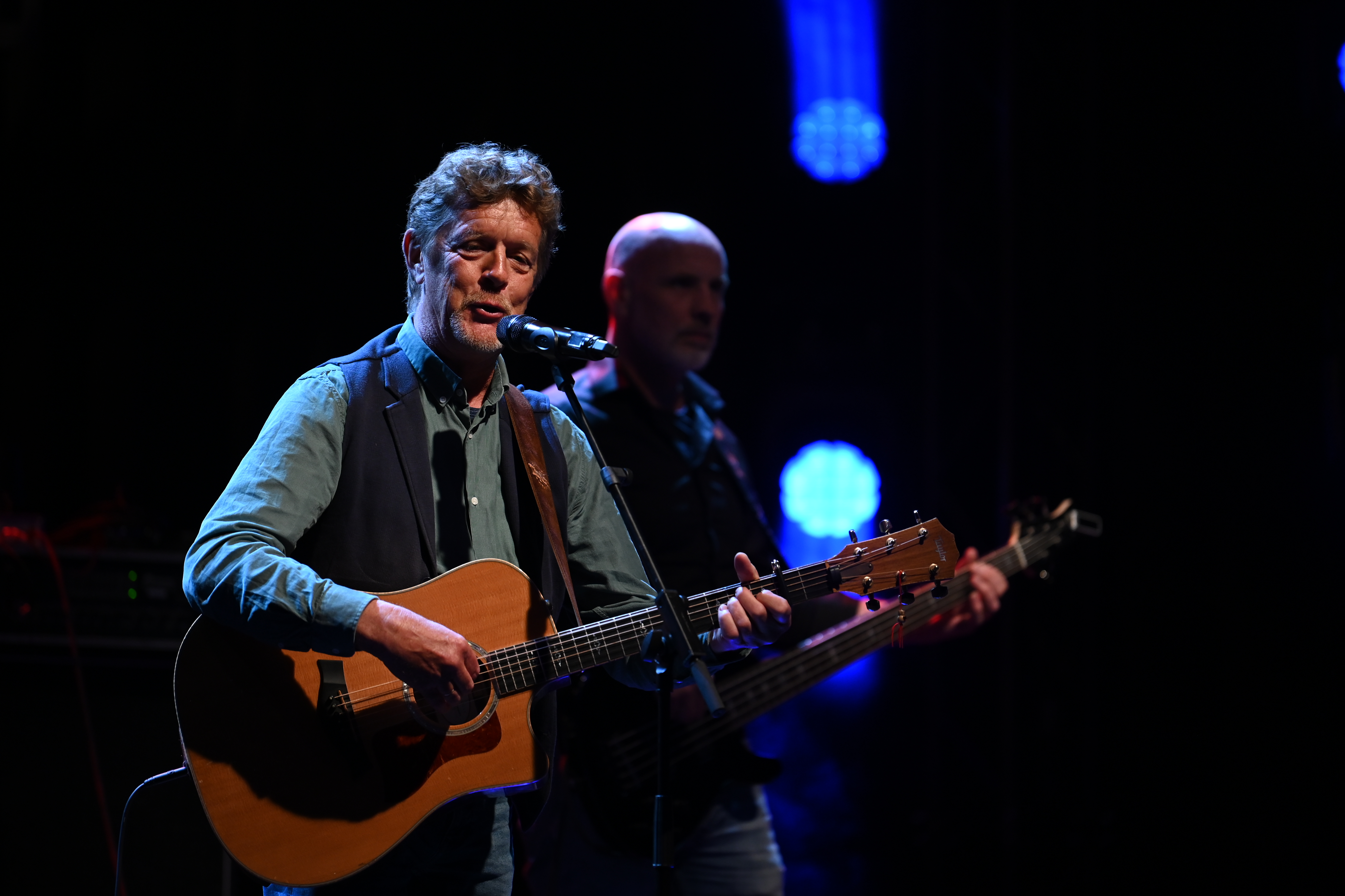
As in many other types of song contest, there were both songs with sad and fun themes. And since the piano was never on fire, we got what a linguist would take instead: linguistic variation. We were presented with energy early on by Martin Hørløck, who with his serious rock-and-roll guitar and Æ Nordschleswig-Lied focused on how language and identity belongs together, in Southern Jutlandic and German. We also experienced special vocal performances: Billy Fumey’s acustic guitar was combined with yodling in a Franco-Provençal song about the harbour Port Titi, while Ingá-Máret Gaup-Juuso from Finland incorporated the traditional vocal style of joik into her sámi lyrics, together with e.g. a set of drums with a nice solo that fit into the otherwise relaxed context of the song. The Iberian peninsula’s languages were also represented: Carolina Rubirosa expressed the emotional effect of a walk in Galician with her band and their just as effective music, while Roger Argemi shared a Catalan pop-track dancing around the stage, and one could feel that these people already had albums, competitions or professional collaboration as part of their experience. An accordion was utilized by both Adri de Boer, who in West Frisian delivered a quiet love song that reminded me about my young days at flea markets, and by Jimi Henndreck (a pun on Jimi Hendrix and Hühnerdreck ‘chicken poo’) who started a party with their song in South Tyrolean through their self-proclaimed “strange” Stubnmusik – in the good way. The party may have peaked with Die Tüdelband and their Low German and kazoo sounds in fast pacing told that they would use one wish to keep the world spinning and love lasting. The sadder feelings were put into play by Martje Johannsen & Christoph Hansen from the band Mungard, as they told the North Frisian saga about Maleen and how she passed away by the sea, through an emotional voice performance and piano. Unfortunately, Martje Johannsen was sick and only present as a video and the sound of her otherwise beautiful voice. Doria showed us a strong Corsican voice with matching in a powerful history lesson. Emanuele Pintus connected with the audience with his Sardinian story about an unfortunate big brother, by stopping the music before the last chorus and making us clap along. The duo Yourdaughters – a name that the sisters came up with when they were uploading their homemade birthday songs for their mother to Spotify – told us about the hudsult (approx. ‘touch starvation’ – the Danish became widespread during lockdowns) of a relation, in a subdued tempo and with a performance that gave us the feeling of the intimacy not present in the relation that the Danish lyrics were singing about. Sofi and the Baladis from the Samaritan community performanced an ancient Hebrew prayer with music from a range of traditional instruments (and my impression is that the Samaritan Hebrew is the minority language here [Update: I can confirm, thanks to a Twitter user that reached out, that the language in the song is indeed different from Modern Hebrew, and specifically contains some verses from the Samaritan Torah that differ from other versions – besides Samaritan Hebrew, there may be parts in Samaritan Aramaic]), which started carefully and then sped up later.
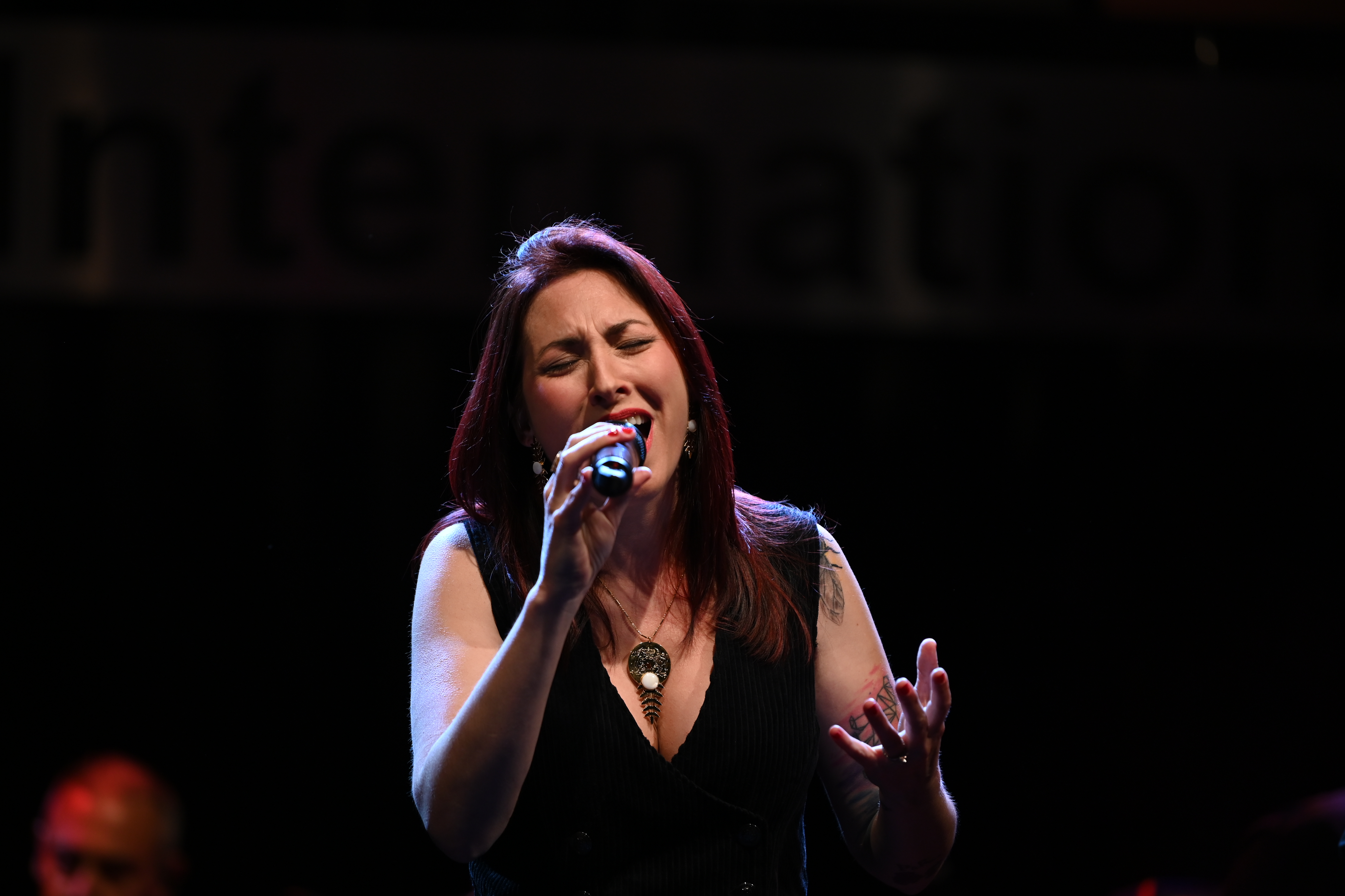
In conclusion, Liet International (and the filled room in Tønder) provided a cozy evening of a wide variety of livemusic with both experienced and upcoming artists from various traditions. It was also mentioned that several of the artists make music in other languages that the one they used at Liet International.
The winner of Liet International
There is both an audience award and a jury award. The audience award was found by a vote, that we could send through a QR-code a link provided in the book we received when arriving. I had one vote and could vote for anyone I wanted among the 13 artists. The audience award went to Emanuele Pintus and was presented by Marion Petersen, chairwoman of the Bund Deutscher Nordschleswiger’s council of culture, one of the important organizers. I don’t know if it may also have been possible to vote from home watching the livestream somehow. We had to fill it out before the break, and while we did so, the Ukrainian artist Ingret Kostenko, who became number two in the Ukrainian edition of Voice in 2017, sang a couple of her songs. She had also done so at the beginning of the event.
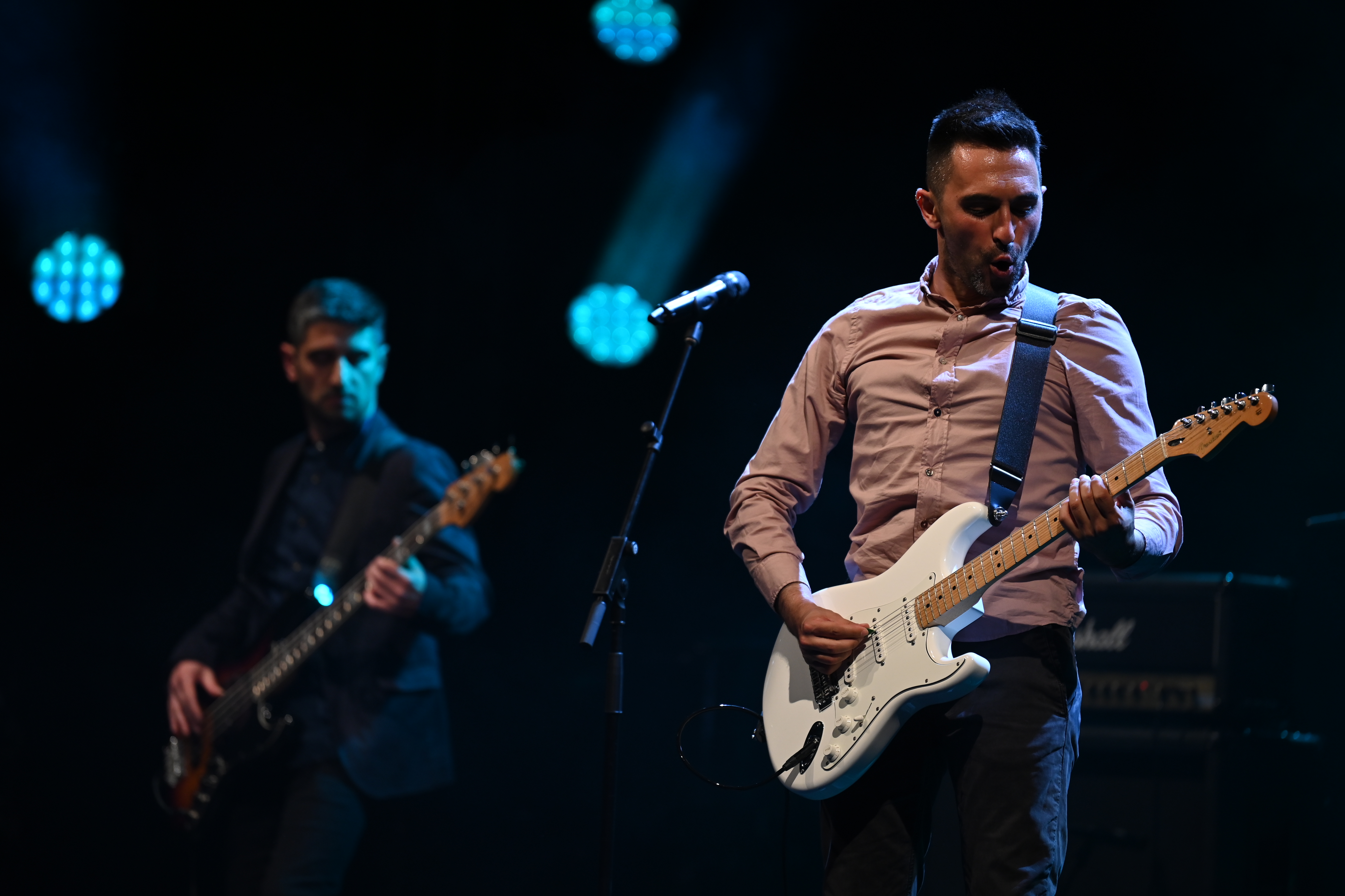
The winner of the jury award is decided by the jury, and it consisted of 13 members, one representing each language or language area. The jury award was presented by Per Rasmussen from Sydbank Fonden, one of the sponsors. The jury members awarded points: 1-10, 12 or 14, but were not allowed to give points to the song of the language they were chosen to represent. In the case of a draw, the song with the most 14’s would have won. My impression was that most of the jury members were artists of minority languages themselves. There was a screen where the points were counted live. The “small” points were added without mention, but the jury members presented their 10, 12 and 14 points orally, which were then also added to the screen. The oral delivery also happened in multiple languages.
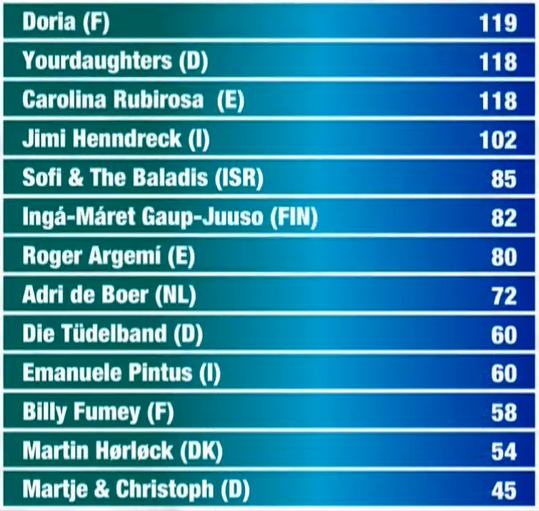
It was a wildly exciting voting process, and early on, Yourdaughters were placed in the top and stayed there for a good amount of time, but never that far from the rest. At least I started cheering for them! Halfway through the tallying, they were asked how they felt about it, and they revealed that they were surprised how well it was going since it was their first performance. Men during the last two jury members, the room shared dramatic gasps as Doria surpassed both Carolina Rubirosa and Yourdaughters by one single point and came in first. No artist received zero points.
We stayed for a little while afterwards, but were very tired after the many experienced and needed to sleep soon. We drove home the day after, and managed to drive right behind two busses from Omrop Fryslân, responsible for the live stream, for approximately one kilometer. You can watch all of Liet International 2022 on their YouTube-channel.
Søren Sandager Sørensen is a postdoc on the project Grammar in Everday Life, and knows mostly about tones through his research on Danish intonation, but enjoys concerts and hopes to one day visit Liet International again.








1 thought on “Report from Liet International 2022 – Corsican victory and almost a Danish-language winner”